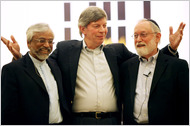How, you might wonder, could “happy holidays” have wound up being used as a subterfuge for passive aggression against a major holiday. The practice might well be akin to the impersonal politeness that some people dish out at others whom they don’t like. The duplicity involved in using “happy holidays” becomes transparent when all of a sudden after a week of “happy Thanksgiving,” the next major holiday–the next national holiday–is obviated with the generic “happy holidays.” The referent is never clear, but it is not supposed to be. The intended object of the slight is of course Christmas.
Interestingly, the sheer magnitude of Christmas finally breaks through on Christmas Eve day, when people are able to summon the requisite guts to vocalize “Merry Christmas” in greeting strangers as well as friends and family. It is as though people know that political correctness is unjustly imposed and say to themselves when the intensity of Christmas overcomes them, “to hell with it (really “them”), I’m going to say it anyway.” I suspect that they tacitly know that “happy holidays” is something that they tolerate but do not accept. That is to say, on the cusp of Christmas most people reckon enough is enough. The force of the Christmas surge overcomes the feckless wall. Of course, there are the diehard holidays people who insist on their politically correct greeting even on Christmas Eve day when the obvious holiday could only be Christmas. Such people are utterly fake–they seek to impose a vaccum of cold empty space. Once the front guard has broken through the imposition on the cusp of Christmas, nearly it isn’t long before nearly everyone is wishing a Merry Christmas. From this standpoint, is easy enough on the day after Christmas to go from “Merry Christmas” on to “Happy New Year.” Happy Holidays is then only on the tardy television ads–which attest to the utter fakeness of the phrase. That we don’t go back to “Happy Holiday” after the excitement of Christmas has passed not only points to the force of habit; it also indicates the duplicitous use of the phrase–singling out Christmas. All of a sudden, it is once again ok to go back to using the holiday’s name. What we are essentially witnessing here is disfavoritism being imposed in resentment.
To single out one of the national holidays in using the generic term “holiday” in place of the proper name is inherently insulting to those who celebrate that holiday. Various motives go into the resentment. First, there is the mistaken assumption that Christmas is only a religious holiday; the fact that non-Christianscelebate it can safely be ignored. In actuality, Christmas is not theologically a religious holiday at all. The theological events concerning Jesus are his incarnation (i.e., at his conception rather than birth) and resurrection (i.e., Easter). To treat Christmas as akin to Easter is to make a theological category mistake. In fact, Jehovah’s Witnesses or Pentacostals (I can’t remember which) refuse to celebrate Christmas precisely because it is not a religous holiday in Christianity. One need only look at the Christmas trees and gift-exchanges in India and China to realize that millions of non-Christians celebrate “the holiday.” Ignoring all this, some people who resent Christianity–perhaps even jealous from the mistaken association of Christmas with their own religious holidays–say “happy holidays” as a weapon of passive aggression as if to say “you must ignore Christmas because it is not my religous holiday.” Such resentement is of and for the weak, according to Nietzsche–who was no anti-semite (in fact, he detested his brother-in-law for being one).
Second, some people are happy not to recognize Christmas because it has become so commercialized. Among these people are those who mistakenly make the assumption above, and thus want to “put Jesus back into Christmas.” However, there are non-Christians who celebrate Christmas and yet are turned off when stores are so greedy for business that they put up their Chrismas displays even before Halloween. As a form of passive aggression, we might try wishing store clerks a such stores a “happy holiday” before Thanksgiving.
In general terms, I recommend that “happy holidays” be used in general before Thankgiving, after which we should turn on a dime on “Black Friday” to wish people a “Merry Christmas.” Then immediately after Christmas, we should return to “happy holidays” instead of “Happy New Year.” Essentially, following this recommendation is to make transparent the duplicity in the current usage of “happy holidays” by using duplicity against the duplicity–passive aggression against the passive aggression. All of it, subterranean.
I suppose the issue is whether a minority opposed to a holiday should be given such power that the rest of us feel ashamed to refer to the holiday by its name. The weak use subterfuge in order to dominate beyond their means, out of resentment. They are herd animals who want to dominate the herd, but they are not strong enough. We unwittingly give the resentful power beyond their means when we stop ourselves from saying Merry Christmas and Happy New Years.” In effect, we feed their resentment and become weak ourselves.
Just to be clear: Thanksgiving, Christmas and New Years are national holidays in the United States. After Thanksgiving, Christmas is the only gift-giving official holiday. So “gifts for the holidays” is needlessly opaque (besides being passive aggressive). Also, there is no such thing as a holiday tree. Will we sit back and permit some people to redefine terms as per their ideological agenda? I suspect we will because we are too vulnerable…not paying sufficient attention.
And, now, as you might be expecting, permit me to wish a Merry Christmas to all, and to all a good night.
For more, pls see http://twitter.com/deligentia
